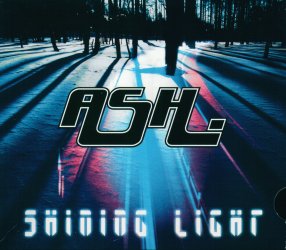
"Shining Light" is a song by Ash, which was released as the first single from their album Free All Angels. It was released on 29 January 2001. It was released as a single CD and as a 7-inch vinyl. It was also Ash's first single to be released as an enhanced CD. "Shining Light" reached number eight on the UK Singles Chart. The song had been covered by fellow Downpatrick songwriter Triona in 2015 which featured on a Power NI advert.
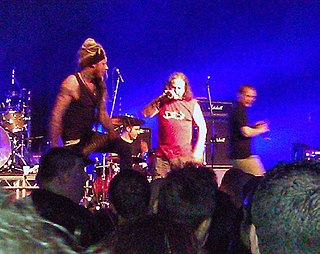
Pop Will Eat Itself are an English alternative rock band formed in 1986 in Stourbridge in the West Midlands of England with members from Birmingham, Coventry and the Black Country. Initially known as a grebo act, they changed style to incorporate sample-driven indie and industrial rock. Graham Crabb describes their sound as "electronic, punk, alternative hip-hop, hybrid music for fucking, fighting & smoking cigars". Their highest-charting single was the 1993 top-ten hit "Get the Girl! Kill the Baddies!". After initially disbanding in 1996, and having a brief reformation in 2005, they issued their first release in more than five years in 2010.

"Sliver" is a song by the American rock band Nirvana, written by vocalist and guitarist Kurt Cobain and bassist Krist Novoselic.

"Stay Together" is a non-album single by English band Suede, released on 14 February 1994 through Nude Records. It is the last single released while guitarist Bernard Butler was in the band, though subsequent singles from Dog Man Star feature his music. It is tied with "Trash" as the highest-charting single the band has released, reaching No. 3 on the UK Singles Chart. The song also charted in Ireland, peaking at No. 18. The single was released in the US on 26 April as a six-song EP, and was the first release by the band as the London Suede. The State-side name change was the result of a successful lawsuit brought by Suzanne deBronkart, who had already been performing and recording in the US under the name Suede. The title track and the popular B-side, "My Dark Star", were ranked Suede's third and fourth-best songs by The Guardian in 2014.

"Confide in Me" is a song recorded by Australian singer Kylie Minogue, taken from her self-titled fifth studio album (1994). It was released as the album's lead single on 29 August 1994 by Deconstruction, Imago, and Mushroom Records. The track was written by Steve Anderson, Dave Seaman, and Owain Barton, whilst production was handled by British trio Brothers in Rhythm. It was recorded in London, United Kingdom at DMC and Sarm West Studios. Musically, it is a pop song that incorporates elements of indie music, trip hop, and Middle Eastern instrumentation such as strings and percussion, whilst the lyrical content talks about Minogue's earnest of seduction and manipulating people to confide into her.
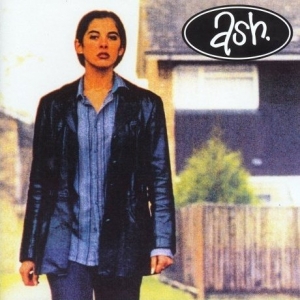
"Goldfinger" is a song by Northern Irish band Ash, released from their debut studio album, 1977 (1996), on 15 April 1996. The song was written by Tim Wheeler and produced by Owen Morris. It was released as a single CD, a 7-inch vinyl, and as a cassette.
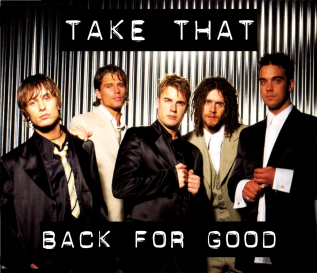
"Back for Good" is a song by British band Take That from their third studio album, Nobody Else (1995). It was written by lead singer Gary Barlow, who also co-produced it with Chris Porter. The song topped the UK Singles Chart whilst also charting at number one in 31 countries, as well as reaching the top 10 in many others. At the 1996 Brit Awards, "Back for Good" won the Brit Award for British Single of the Year. In 2003, Q Magazine ranked the song at number 910 in their list of the "1001 Best Songs Ever" and in a UK poll in 2012, it was voted number 11 on the ITV special The Nation's Favourite Number One Single.

"Make Me Smile (Come Up and See Me)" is a song by the British rock band Steve Harley & Cockney Rebel, which was released in 1975 by EMI as the lead single from the band's third studio album The Best Years of Our Lives. The song was written by Harley, and produced by Harley and Alan Parsons. In February 1975, the song reached number one on the UK chart and received a gold certification from the British Phonographic Industry in October 2021. It spent nine weeks in the Top 50, and as of 2015, has sold over 1.5 million copies worldwide.
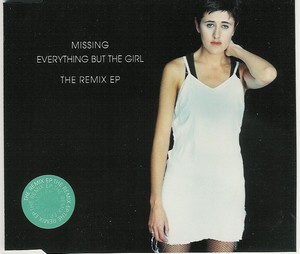
"Missing" is a song by English musical duo Everything but the Girl, taken from their eighth studio album, Amplified Heart (1994). It was written by the two band members, Tracey Thorn and Ben Watt, and was produced by Watt and John Coxon. It was taken as the second single off the album on 8 August 1994 by Blanco y Negro Records in the United Kingdom and by Atlantic Records in the United States. It initially did not achieve much success until it was remixed by Todd Terry and re-released in 1995, resulting in worldwide success, peaking at or near the top of the charts in many countries. The release of the remixed version of "Missing" gave an indication of the band's future experimentation with more electronic dance music on subsequent albums.

"Respectable" is a song by English musical duo Mel and Kim from their only studio album, F.L.M. (1987). It was released on 18 February 1987 as the album's second single. The song reached number one on the UK Singles Chart for one week in March 1987, becoming the second UK number-one single produced by Stock Aitken Waterman (SAW), following Dead or Alive's "You Spin Me Round " (1985), and the first UK number one that the trio had written themselves. The single also topped the charts in Australia, Belgium, Finland, the Netherlands, New Zealand, Switzerland and West Germany.

"Oh Yeah" is a song by Northern Irish rock band Ash, released as the fifth single from their debut studio album, 1977 (1996), on 24 June 1996. It was released on CD, 7-inch vinyl, and cassette formats. Upon its release, "Oh Yeah" debuted and peaked at number six on the UK Singles Chart, becoming Ash's second-highest-charting single on the chart following their previous release, "Goldfinger".

"A Life Less Ordinary" was a non-album single released by the band Ash on 13 October 1997. It was the title track of the film of the same name, A Life Less Ordinary, starring Cameron Diaz and Ewan McGregor, and also appeared on the film's soundtrack. The single was released in three formats: CD, 7-inch vinyl, and cassette. The limited-edition 7-inch was printed on blue vinyl. The song peaked at number ten on the UK Singles Chart.
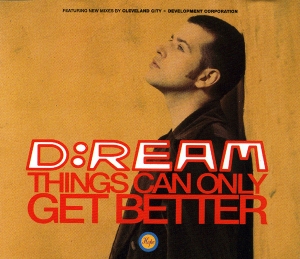
"Things Can Only Get Better" is a song by Northern Irish musical group D:Ream, released in 1993 as the second single from their debut album, D:Ream On Volume 1 (1993). It took several months to reach the top of the UK Singles Chart. Originally a club hit, pop success took much longer for the song—initially, it reached only number 24 on the chart in January 1993. Band member Al Mackenzie left later that year, and remaining member Peter Cunnah took the band in a more pop-friendly direction.

"Babe" is a song by English boy band Take That, released as the fourth single from their second album, Everything Changes (1993). Written by Gary Barlow, it features Mark Owen on lead vocals. Production was led by David Clayton, who later spent 10 years as keyboard player and backing vocalist with Simply Red. The song was a number-one hit in both Ireland and the United Kingdom while peaking within the top 10 in Belgium, Finland, Germany, Israel, Lithuania, the Netherlands, Norway, Sweden and Switzerland.
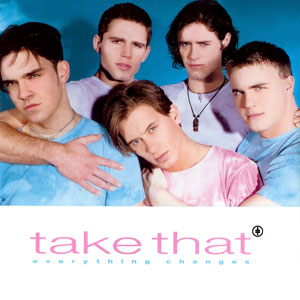
"Everything Changes" is a song by English boy band Take That. Released as the fifth single from the band's second studio album, Everything Changes (1993), and written by Gary Barlow and producers Michael Ward, Eliot Kennedy and Cary Bayliss, the song features Robbie Williams on lead vocals.

"Save Our Love" is a song by British R&B girl group Eternal. It was released in January 1994 as the second single from their debut album, Always & Forever (1993). The single entered at number 12 on the UK Singles Chart on 15 January, climbing to its peak of number eight the following week, and remained in the UK top 75 for seven weeks. On the UK Dance Singles Chart, it was even more successful, reaching number six. A music video was filmed for the song in December 1993.
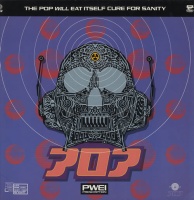
Cure for Sanity is the third studio album by English rock band Pop Will Eat Itself, released on 22 October 1990 by RCA Records. Upon its release, the album entered the UK Albums Chart and stayed there for two weeks, peaking at number 33, and re-entered the chart when it was re-released in July 1991, staying there for one week at number 58. In Australia, the album peaked at number 51 and spent six weeks on the ARIA top 100 albums chart.

"Love Changes (Everything)" is a 1987 single by British pop duo Climie Fisher that gained international success after a re-release in 1988. The song was later covered and released by house music duo Musikk. Songwriters Simon Climie, Dennis Morgan and Rob Fisher received the 1988 Ivor Novello award for Best Song Musically and Lyrically.

"Love Rendezvous" is a song by British band M People, released in 1995 as the fourth single from their third album, Bizarre Fruit/Bizarre Fruit II (1994). Written by Mike Pickering, Paul Heard and Heather Small, and produced by M People, the song was released on 14 October after the band's world tour. It peaked at number thirty two on the UK Singles Chart.

"Gold" is a song by English boy band East 17, taken from the band's debut album, Walthamstow (1993). Written by Tony Mortimer, it was released on 2 November 1992 as the second single from the album. The song was successful in only a few countries, peaking at number two in Sweden, number three in Finland, and number 28 in the UK. Outside Europe, it reached number one for four weeks in Israel.





















